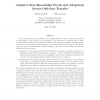122 search results - page 1 / 25 » Achieving Security Despite Compromise Using Zero-knowledge |
155
click to vote
CSFW
2009
IEEE
15 years 8 months ago
2009
IEEE
One of the important challenges when designing and analyzing cryptographic protocols is the enforcement of security properties in the presence of compromised participants. This pa...
117
click to vote
TCC
2009
Springer
16 years 2 months ago
2009
Springer
In the setting of secure computation, a set of parties wish to securely compute some function of their inputs, in the presence of an adversary. The adversary in question may be st...
129
click to vote
ICALP
2007
Springer
15 years 3 months ago
2007
Springer
Adaptive security, while more realistic as an adversarial model, is typically much harder to achieve compared to static security in cryptographic protocol design. Universal composi...
IH
2001
Springer
15 years 6 months ago
2001
Springer
The goal of zero-knowledge watermark detection is to allow a prover to soundly convince a verifier of the presence of a watermark in certain stego-data without revealing any infor...
107
click to vote
CRYPTO
2001
Springer
15 years 6 months ago
2001
Springer
Abstract. Non-Interactive Zero Knowledge (NIZK), introduced by Blum, Feldman, and Micali in 1988, is a fundamental cryptographic primitive which has attracted considerable attentio...


